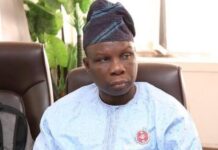The Nigerian government is doing its best to contain the spread of coronavirus in the country. The same can be said of various state governments. Each has come out with various measures meant to safeguard the people.
The most prominent of the methods being adopted by both the federal and state governments is the “lockdown” method.
This method is a desperate one and was first used by China in Wuhan. The coronavirus, being a novel disease, took the Chinese authorities by surprise when it first broke out.
Therefore, in its effort to stop its spread and manage prevalent cases, the Chinese adopted the lockdown policy.
People were made to remain at home for an initial two weeks, the period in which the virus incubates, festers and begins to show symptoms, and encouraged by the flattening of the hitherto rising curve, it was extended by more weeks.
Within that period, almost all human activities in Wuhan and some other districts came to a halt except for basic activities, chief among them security, medical activities, some aspects of mass media, food and delivery services.
Industries, factories, offices, all businesses were closed and all means of production halted. But China’s economy was already in superb shape and so it could afford to carry Wuhan for the period of the lockdown, more so as Beijing, Shanghai and other major cities were not closed.
Not only that, the government put in place splendid welfare packages for small and medium businesses so as to ride through the storm without having losses or disengaging staff, thereby increasing unemployment. Middle class and lower rung people were also catered for through provision of food items and other basic necessities.
But one important thing that helped the Chinese to successfully flatten the curve and reverse the trend is discipline. The government at all levels did their best to enforce the lockdown but the people also cooperated fully because they knew why. There was sufficient awareness. Now they are back on the streets and production is picking up.
This is virtually the story all over Europe. In their bid to flatten the coronavirus curve, citizens were virtually paid to remain at home. However, despite the pathetic situation, governments and businesses are bracing up to face the reality that no nation can survive elongated lack of production as a result of any sustained lockdown.
This brings us to Nigeria and this pandemic. Can Nigeria afford a prolonged lockdown that affects production?
Perhaps if the lockdown would be observed as it should, we may benefit at least through curtailing the spread of the virus. However, our lockdown is a joke as people go about their businesses in many areas as if nothing is at stake.
Again, there is no police division or command that has a full or complete map of its division or command. Therefore the police cannot map out a comprehensive strategy of enforcement. Even if they can, they lack the manpower to do so. And as is happening, they are, in some instances, compromised by defaulters or use excessive force such that, at a time, those killed by security agents surpassed those killed by the dreaded disease.
In many areas in towns purportedly under lockdown, it is business as usual, perhaps knowing you are on your own because “palliatives” are just for publicity; therefore, governments’ hope of flattening the curve may not be achieved. Now, when you put this side by side with the stoppage of production, then we may inadvertently find ourselves in serious trouble.
The eradication may take time – maybe a year or so when drugs or vaccines for its cure become available – but surely the infection rate can be seriously reduced, thereby not overstretching or overstressing our poor health infrastructure. However, we must stimulate consumption which will ginger more production while at the same time vigorously fighting to flatten the curve, decelerate the rate of spread and ultimately eradicate the disease. Governments and business entities can empower facemask, PPE and hand sanitiser producers. We may even export them earning hard currency in this period.
Therefore, lockdown is not for a country where it cannot be enforced and surely not for a country whose economy is weak, whose citizens, at least 95%, live by the day. What should work for us is massive awareness on prevention.
Wearing of facemasks and social and physical distancing must be enforced, mass gatherings discouraged, frequent washing of hands emphasised, steam inhalation and gargling and consumption of hot/warm fluids encouraged.
It will be cheaper for governments at all levels to erect tea vending machines almost everywhere than have the nation’s productive workforce locked down at home and lying fallow. Public and private offices can be encouraged to have these as well as provisions for hand washing. Commercial vehicles must reduce the number of passengers they take and all public places like markets and motor parks need to be decentralized and disinfected regularly. Their managements must provide hand washing materials.
Then government and corporate bodies, including well-to-do individuals, must go further by providing more isolation centres and testing capacities. It is disheartening that there are only 15 testing centers in the country serving a population of 200 million.
As a matter of urgency, every state capital in the country must have at least one testing centre, every senatorial district should also have at least one immediately while each local government must have one before the middle of June.
All necessary requirements for a standard health care system should be available. Our health workers must be provided with Personal Protection Equipments (PPEs) and necessary drugs must be readily available.
Talking about drugs, what harm does it constitute if our government tests the claims of our people who say they have traditional remedies?
Just last week, Mr Andy Rajoelina, the president of Madagascar, unveiled “COVID Organics” (CVO) in Antananarivo. It is a remedy from the Malagasy Institute of Applied Research (IMRA) created from the Artemisia plant and is supposed to prevent infection, though he said it can also be curative.
Claiming the herbal tea had already cured two people, the president even took a dose, saying, “I will be the first to drink this today, in front of everyone, to show you that this product cures and does not kill”. This is high confidence in his people and their handiwork. This is a country with just above 120 cases (last week) and no fatality, yet they are actively seeking preventive and curative remedies.
We Africans should not belittle ourselves. We should not be enslaved by inferiority complex. We should never feel intimidated, incapable and/or useless to the extent that we think only the whites can provide solutions to life’s challenges, and not us. We have a rich history in the area of medicine even before the advent of the white man. Who said we cannot be the world’s and humanity’s saviour this time around?
There are some people who have come out to tell the world that they have cure for coronavirus. Professor Maurice Iwu said he has a cure. Now, Professor Iwu is not your ordinary man. He is a professor of Pharmacognosy and a former chairman of the Independent National Electoral Commission (INEC). Yet he was disdainfully shunned making him turn to the Americans, now testing his claims.
Malam Idris Ibrahim Kalgo, an Abuja-based Kebbi indigene confirmed to me in an interview that he has developed a cure through mixtures that go as Islamic Medicine, generally based on the advice of the Prophet of Islam, Muhammad (SAW). He came out in a viral video to proclaim his discovery and went as far as assuring three days for recovery. He claims those he has cured, including a Customs officer, are ready to testify. Just last week, scientists from University of Ibadan have come up with another from a plant found everywhere in the country.
There are other Nigerians with such claims. Professor Ayodele Adeleye, a Kaduna-based scientist, Onwubiko Ezeibe, a professor of small animals and clinical virology renowned for developing efficacious vaccines, based in Umuahia, Abia State and Professor Maduike Ezebe of the Michael Okpara University of Agriculture, Umudike are some while Bright Eworo, a first-class graduate from Cross River State and Dr Ben Ahmodu who headed the pharmacy departments of Aso Clinic and the National Hospital are others.
From the orthodox medicine side, Dr Faruk Bande, a young veterinary doctor with Bayero University, Kano, who has a PhD in virology has confirmed to me that he and his team have all it takes to develop a vaccine against this dreaded virus, yet no one, it seems, is giving them an ear.
One is wont to ask, why are we not considering their claims? Are we so low that we do not believe in ourselves or that something good can come from us? What is wrong in checking? No one is even saying “give them funds for further research”. No. Check, if they are ruses, we discard, but if genuine, we save the world and humanity.
Follow the Neptune Prime channel on WhatsApp:
Do you have breaking news, interview request, opinion, suggestion, or want your event covered? Email us at neptuneprime2233@gmail.com





